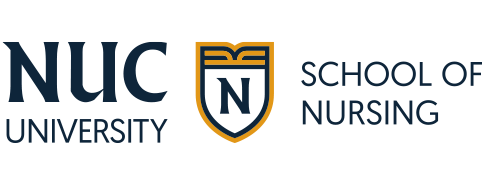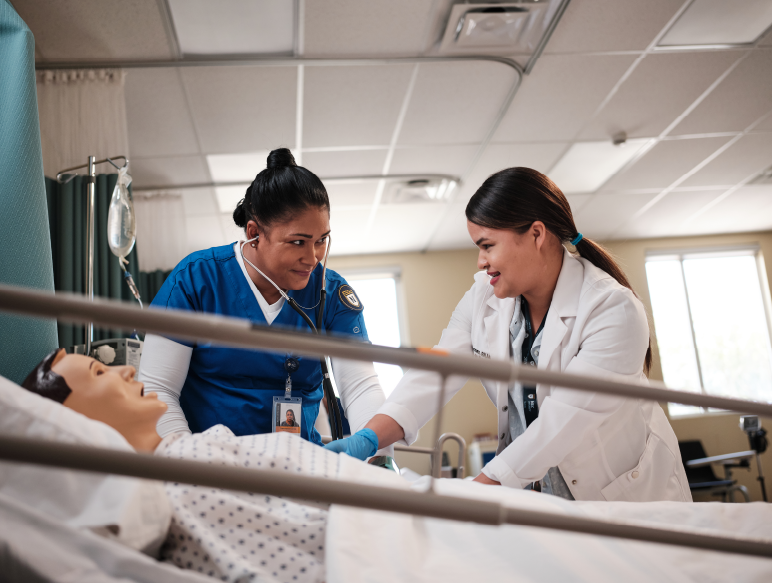Nursing is far more dynamic and versatile than some may realize. Yes, registered nurses (RNs) and advanced practice registered nurses (APRNs) serve numerous crucial clinical functions, but this field is by no means limited to patient education or bedside care.
Through years of hard work and exposure to powerful ideas and opportunities, many nurses uncover a passion for adjacent pursuits, such as nursing education or research. These niches allow nurses to contribute to a growing body of healthcare knowledge while also ensuring that future nurses have the skills to thrive in this important field.
Two of the most exciting opportunities include nursing education and nursing research. These fields are unique in that they allow experienced nurses to draw on their extensive knowledge and understanding as they guide other nurses — either through direct instruction or by conducting studies that contribute to the overarching nursing body of knowledge.
If you are interested in moving into one of these nursing niches, you will want to plan this career move carefully. This plan must be personalized, as your previous nursing experiences could play heavily into your transition. What’s more, you may need to commit to several years of additional study, along with licensure/certification exams and other essentials that convey your readiness to handle the distinct demands of instruction or research.
This might seem like a major commitment, but the rewards are considerable while you help shape the future of nursing. Uncover the opportunities and challenges associated with two especially essential specialties, and discover what it takes to prepare as a nurse educator or nurse researcher.
Understanding the Role of a Nurse Educator
Nurse educators hold considerable influence over every corner of nursing, not to mention the healthcare sector at large. They have a critical responsibility: to guide and shape the nurses of tomorrow. These professionals plan and teach courses designed to prepare aspiring nurses to succeed in clinical environments. Meanwhile, they help current nurses acquire new skills so they can provide a higher quality of care as they advance in their careers.
This role is distinct in that it calls for clinical nursing expertise but also involves instructional skills that some otherwise talented nurses may lack. An effective nurse educator will inspire future nurses, helping them master difficult concepts while gaining both the clinical skills and personal confidence demanded in the modern nursing profession.
Key Responsibilities and Impact on Healthcare
Individual nurses credit educators with motivating them to provide exceptional care — and to maintain a spirit of lifelong learning, complete with the desire to explore cutting-edge research and opportunities as part of an ethos of evidence-based practice. However, the influence of nursing education extends far beyond individual outcomes and could determine whether the field as a whole achieves its primary objective: “to provide a safe and caring environment that promotes patient health and well-being.”
The American Nurses Association (ANA) refers to nurse educators as the “architects of the future nursing workforce,” adding that educators must help future nurses become not only “clinically competent but also adept at leveraging technology, innovative in problem-solving, and capable of leading in diverse healthcare settings.”
Numerous daily tasks and responsibilities allow educators to meet these ambitious goals. Examples include:
- Designing and planning courses and curricula that align with stringent healthcare standards.
- Using an evidence-based approach to integrate new concepts and skills into clinical practice.
- Performing assessments to ensure that students are successfully acquiring essential nursing skills.
- Creating instructional materials that nursing students find engaging and informative.
Essential Skills for Effective Teaching in Nursing
It takes a deep understanding of evidence-based practice to succeed in nursing education — but that’s only the beginning. Even some of the best nurses may not be suited to this role if they struggle to convey what exactly makes them so effective as clinical professionals. The most impactful nurse educators possess (and continually strive to improve upon) these core competencies:
- Emotional intelligence and empathy, which allow nurse educators to support and inspire students when they struggle to master key skills or concepts.
- Adaptability so educators can adjust their instructional approach to meet the varying needs of different students or classes.
- Clinical expertise, including a thorough understanding of foundational nursing concepts so that all information is accurate and appropriately conveyed. Depending on the courses taught, some nurse educators may need niche or specialty experience.
Pathways to Becoming a Nurse Educator
Nurse educators must hold a wealth of experience, including several years of success as RNs or APRNs. Upon choosing to transition into nursing education, they need to develop instructional skills while pursuing additional training. This is where aspiring educators learn to bridge the gap between clinical care and effective instruction.
Educational Requirements and Prerequisites
The first step toward becoming a nurse educator always involves becoming a nurse: completing either the associate degree in nursing (ADN) or Bachelor of Science in Nursing (BSN), plus passing the NCLEX exam. The BSN is not always needed to become an RN, but it will almost certainly be necessary to ascend into the role of nurse educator. Increasingly, these roles call for graduate-level credentials, such as the Master of Science in Nursing (MSN) or the Doctor of Nursing Practice (DNP).
Certification and Licensing: A Step-by-Step Guide
Upon securing the necessary nursing degrees, aspiring nurse educators often seek relevant certifications. One of the most common and respected options is the National League for Nursing’s (NLN) Certified Nurse Educator (CNE). This certification aims to “establish nursing education as a specialty area of practice and create a means for faculty to demonstrate their expertise in this role.”
To secure certification as a CNE, aspiring nurse educators must obtain their master’s or doctoral degree (and pursue specialized instruction in nursing education) and pass a rigorous exam. This test touches on educational theories, social determinants of learning, assessment methods, and more.
Transitioning From Clinical Practice to Academia
The transition away from clinical practice calls for a significant shift in mindset, not to mention a firm grasp of instructional methods and strategies. Academic dynamics can be challenging to understand, too, especially after becoming accustomed to the nuances of clinical care. Targeted education can help, however, as can an introduction to nursing research through higher-level nursing roles or leadership opportunities.
Gaining Experience: What Counts?
There are various compelling pathways in nursing education, and ideally, nursing educators will find a trajectory that aligns with personal goals or passions. Often, this involves entering nursing education either in a clinical or academic capacity.
Those who hope to pursue clinical instruction may find opportunities to support nurses’ skill development by taking on roles such as nurse manager or charge nurse. These roles help future clinical nurse educators understand which practices allow novice nurses to master essential skills quickly and confidently. Those wanting to enter the field in a strictly academic capacity might initially fill assistant or associate faculty roles.
Overcoming Challenges in the Shift to Nurse Education
Some nurses may find the transition to education easier than others. Many quickly come to miss direct patient interaction, although the rewards of working closely with patients can be replaced by the unique satisfaction of interacting with passionate nursing students. Other common obstacles relate to curriculum development and student engagement. Nursing educators may also initially find it difficult to adjust to the cultural nuances of the academic environment.
Through exposure and ongoing professional development, though, many learn to leverage soft skills (such as adaptability or emotional intelligence) previously gained through clinical nursing and embrace the possibilities of nursing education.
Exploring the World of Nurse Researchers
The modern nursing field relies heavily on evidence-based practice, which encourages nurses at all levels to incorporate relevant findings into everyday clinical strategies. However, this approach will only be so useful if not accompanied by cutting-edge research. The nurse researcher’s role, then, is to contribute to this research so that nursing professionals are fully informed.
The Critical Role of Research in Nursing Practice
Evidence-based practice is a clear priority across the scope of modern nursing — but this is not effective unless nurses can draw on a wealth of up-to-date evidence, gained through conducting focused research initiatives. This is where nurse researchers shine.
As Marian Altman, PhD, tells the American Association of Critical-Care Nurses (AACN), through research, nursing innovators can “provide empirical evidence to support nursing practice and help [nurses] provide excellent patient care.”
How Nurse Researchers Shape the Future of Healthcare
Nurse researchers have a powerful role to play in driving the field of nursing into a new and exciting era. Leaders from the ANA’s Enterprise Institute for Nursing Research and Quality Management explain that “rigorous, high-quality nursing research creates an evidence base that advances nursing practice, shapes health policy, and contributes to improving nurse, patient, and system outcomes.”
Across all specialties and all levels of nursing, professionals rely on cutting-edge research to inform best practices and influence their clinical approach in a rapidly evolving field.
Becoming a Nurse Researcher: The Essential Steps
There is no singular, clear-cut path to becoming a nurse researcher, although this trajectory typically involves graduate education and a focus on research while completing high-level coursework. Beyond this, many nurses may seek extra certifications or credentials, along with opportunities to integrate the latest research into clinical practice.
Academic and Professional Requirements
Academic requirements can vary somewhat depending on the capacity in which nurses hope to contribute to research. If researching in a professional capacity, many will begin by working as clinical research nurses, as this role leverages clinical skills while providing an optimal bridge between clinical practice and academic research. Typical requirements to work as a clinical research nurse include a bachelor’s degree and licensure as an RN.
Moving more into the academic side of nursing research (such as planning studies and publishing results), nurse scientists or lead researchers focus largely on design and data analysis. These roles are more commonly available to nurses who have trained at the graduate level and delved deep into advanced research as part of their training.
Some researchers may seek relevant certifications from authorities such as the Clinical Research Nurse Certification Council (CRNCC), becoming certified clinical research nurses (CRN-BC) to convey targeted clinical research skills, along with a clear commitment to upholding nursing research ethics.
Finding Your Niche: Specializations Within Nursing Research
Specializations in nursing research can, to some extent, echo specializations in nursing practice. For example, those who have worked extensively as oncology nurses or as nurse midwives may be inclined to continue exploring these specializations by conducting (or supporting) targeted studies in these areas. Many successful professionals report that early specializations sparked their passion for nursing research.
From Nurse Educator to Nurse Researcher
Both nursing education and nursing research hold powerful implications for the future of nursing and the healthcare sector at large. These roles are not always easy to acquire or navigate, but they allow talented nurses to leverage their passion in the hopes of driving positive change.
Leveraging Experience and Education for a Smooth Transition
The shift away from clinical care can be complicated, and after years of exposure to a clinical environment, nurses must adapt to the distinct rhythms and culture of the academic world. This transition may be easier for those who apply their unique education and experience; for instance, those who have worked extensively as pediatric nurses may find it easier to instruct future nurses who also desire to work in pediatrics.
Opportunities and Considerations for Career Advancement
Following several years of success in either nursing education or nursing research, professionals may be ready to continue ascending the career ladder, potentially even taking on leadership roles. This may call for additional nursing degrees or certifications. It is at this point that many, for example, pursue their DNP. Compelling leadership options available to nursing educators or researchers might include:
- School of nursing department chair
- Director of nursing education
- Nursing research director
- Director of nursing professional development
- Healthcare quality improvement consultant
Unlock an Exciting Future in Nursing With Florida Technical College
As you prepare for an impactful future as a nurse educator or clinical research nurse, look to Florida Technical College to support your most ambitious professional pursuits. Our Bachelor of Science in Nursing (BSN) or Master’s could get you on the path to nursing education or research.
Placing a strong emphasis on evidence-based practice, leadership, and ethical decision-making, this program encourages students to embrace their passions and make a mark as influential nursing professionals. Contact us today to request more information.
These examples are intended to serve only as a general guide of possible employment opportunities. There are many factors that determine the job an individual may obtain and Florida Technical College cannot guarantee its graduates any particular job. Some positions may require license or other certifications. We encourage you to research the requirements for the particular position you desire.
Sources
https://ftccollegeprd.wpenginepowered.com/program/bachelors-degree/science-nursing/
https://www.nln.org/awards-recognition/cne/Certification-for-Nurse-Educatorscne/cne-eligibility
https://www.nln.org/certification/Certification-for-Nurse-Educators/cne
www.nursingworld.org/content-hub/resources/nursing-resources/becoming-a-nurse-educator/
www.aacn.org/blog/why-should-i-participate-in-nursing-research




